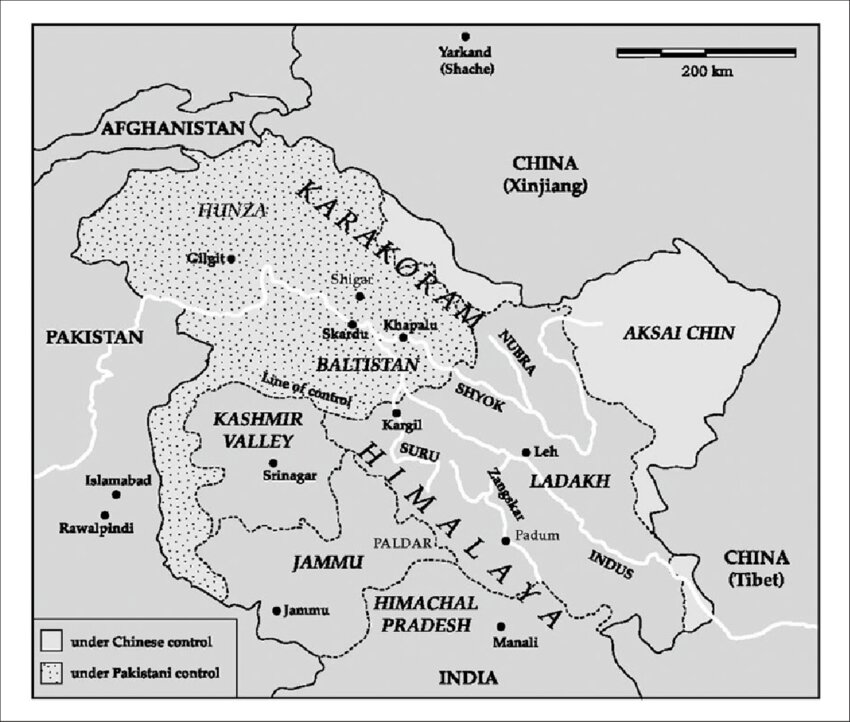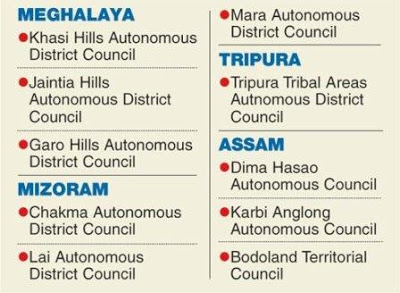Jammu & Kashmir Switch to Hindi
‘Delhi Chalo Padyatra’: Sonam Wangchuk
Why in News?
Recently, over 100 volunteers, led by climate activist Sonam Wangchuk, began a foot march to Delhi, urging the Centre to resume talks with Ladakh's leadership on their four-point agenda.
Key Points:
- The ‘Delhi Chalo Padyatra’ was organized by the Leh Apex Body (LAB) and Kargil Democratic Alliance (KDA).
- 4 Point Agenda:
- They are advocating for statehood.
- Extension of the Constitution’s Sixth Schedule to protect local rights.
- Recruitment process with a dedicated public service commission for Ladakh
- Separate Lok Sabha seats for Leh and Kargil districts.
- Wangchuk, earlier in March held a 21-day long hunger strike in support of the demands.
- After Article 370's removal in 2019, Ladakh became a Union Territory under the Union Home Ministry's direct administration.
What is the Sixth Schedule?
- Article 244: The Sixth Schedule under Article 244 provides for the formation of autonomous administrative divisions, Autonomous District Councils (ADCs) that have some legislative, judicial, and administrative autonomy within a state.
- Current Status : The Sixth Schedule contains special provisions for the administration of tribal areas in the four north-eastern states of Assam, Meghalaya, Tripura and Mizoram.
- Autonomous Districts: The tribal areas in these four states have been constituted as autonomous districts. The governor is empowered to organize and reorganize the autonomous districts.
- District Council: Each autonomous district has a district council consisting of 30 members, of whom four are nominated by the Governor and the remaining 26 are elected on the basis of adult franchise.
- Powers of the Council: The district and regional councils administer the areas under their jurisdiction.
- They can make laws on certain specified matters like land, forests, canal water, shifting cultivation, village administration, the inheritance of property, marriage and divorce, social customs and so on. But all such laws require the assent of the Governor.
- They can constitute village councils or courts for trial of suits and cases between the tribes. They hear appeals from them. The jurisdiction of the high court over these suits and cases is specified by the governor.
- The district council can establish, construct or manage primary schools, dispensaries, markets, ferries, fisheries, roads and so on in the district.
- They are empowered to assess and collect land revenue and to impose certain specified taxes
Chhattisgarh Switch to Hindi
Mahtari Vandan Scheme
Why in News?
Recently, Chief Minister Vishnu Dev Sahay announced that during the Tija-Pora (September 2nd) Mahtari Vandan festival, he will release the 7th installment of the Mahtari Vandan Scheme, providing Rs. 1,000 each to 7 million women beneficiaries.
Key Points
- Eligibility: Must be a resident of Chhattisgarh, 21 years old as of January 1, 2024, and include married women, widows, divorcees, and abandoned women.
- Exclusions: Income taxpayers and government employees are not eligible.
- Launch: Prime Minister of India launched the Mahatari Vandan Scheme on March 10, 2024, and released the first installment.
- Assistance: Provides Rs. 1,000 per month to women aged 21+ (married, widowed, divorced, or abandoned).
- Beneficiaries: Over 7 million women selected; 6 installments have been transferred.
- Payment: Rs. 39.23 billion paid from March to August by the Women and Child Development Department.
- Teeja-Pora: Teeja-Pora is celebrated to honor and appreciate the bulls and buffaloes for their essential role in the farming process.
- It marks the end of the agricultural season and involves rituals to show respect and gratitude towards these animals.
Bihar Switch to Hindi
Bihar Land Survey
Why in News?
Recently, the Government of Bihar has launched an app to provide comprehensive information related to the land survey, addressing the issues faced by people repeatedly visiting block offices for solutions.
Key Points:
- Land Surveys in Bihar: Ongoing in 45,000 villages to digitize land data and resolve land disputes, with a one-year timeframe for completion.
- Objective:
- To facilitate recovery of government land, reduce land-related disputes, and prevent crimes related to land issues.
- If land documents are not presented, the land will be recorded as government property.
- Implementation:
- Once the survey is completed and records are updated, complaints about document withholding will be resolved.
- Officials, including kanungos and lekhpals, have been instructed to set up camps to inform the public.
Uttar Pradesh Switch to Hindi
Model Solar Village
Why in News?
Every village in Ayodhya with a population of 5,000 will be developed as a model solar village, with a goal of installing 50,000 solar homes.
Key Points
- The PM Solar Home scheme aims to turn Ayodhya into a solar city by equipping 50,000 homes with solar panels.
- The Model Solar Village scheme will select one village of 5,000 residents from a list of 42 to promote widespread installation of solar panels.
- Each family for 1 kilowatt solar panel will incur a cost of Rs.65,000, with Rs.30,000 subsidized by the central government and Rs.15,000 by the state government.
- Farmers installing solar pumps will receive extra grants under the KUSUM scheme.
- The central government has allocated Rs.1 crore for each Model Solar Village, which will be transferred to the gram panchayat to fund its development.
What is PM-KUSUM?
- About:
- The PM-KUSUM is a flagship scheme initiated by the Indian government in 2019 with the primary objective of transforming the agricultural sector by promoting the adoption of solar energy solutions.
- It operates on a demand-driven approach. Capacities are allocated based on the demands received from various states and union territories (UTs).
- Through various components and financial support, PM-KUSUM envisions achieving a significant solar power capacity addition of 30.8 GW by March 31, 2026.
- Objectives of PM-KUSUM:
- Reduce the Farm Sector's Reliance on Diesel: The scheme aims to reduce the dependence on diesel for irrigation by encouraging the use of solar-powered pumps and other renewable energy sources.
- It also seeks to increase farmers' income by reducing irrigation costs through the use of solar pumps and enabling them to sell surplus solar power to the grid.
- Water and Energy Security for Farmers: By providing access to solar pumps and promoting solar-based community irrigation projects, the scheme aims to enhance water and energy security for farmers.
- Curbing Environmental Pollution: Through the adoption of clean and renewable solar energy, the scheme aims to mitigate environmental pollution caused by conventional energy sources.
- Reduce the Farm Sector's Reliance on Diesel: The scheme aims to reduce the dependence on diesel for irrigation by encouraging the use of solar-powered pumps and other renewable energy sources.
- Components:
- Component-A: Setting up of 10,000 MW of Decentralized Ground/Stilt Mounted Solar Power Plants on barren/fallow/pasture/marshy/ cultivable land of farmers.
- Component-B: Installation of 20 Lakh Stand-alone Solar Pumps in off-grid areas.
- Component-C: Solarisation of 15 Lakh Grid Connected Agriculture Pumps through Individual Pump Solarisation and Feeder Level Solarisation.
Uttarakhand Switch to Hindi
Changes to File Complaints in Government Departments
Why in News?
Recently, to prevent fake complaints, the Uttarakhand government has made it mandatory to submit an affidavit when filing a complaint.
Key Points
- Issue with False Details: Complaints with incorrect addresses and phone numbers have been found, leading to the new requirement.
- Affidavit Requirement: An affidavit must now be submitted with complaints to prevent fake submissions.
- Objective: The affidavit requirement aims to ensure accurate and valid complaints are registered and handled appropriately.
- Reason: The move addresses the issue of false complaints, which waste resources and time, and helps ensure only genuine complaints are processed.
Haryana Switch to Hindi
Election Commission Postponed Haryana Assembly Elections
Why in News?
Recently, on August 31st, 2024, the Election Commission of India (ECI) revised the polling day for the Haryana Assembly elections from October 1 to October 5.
Key Points
- Date Change Decision: The Election Commission of India (ECI) revised the polling date for the Haryana Assembly elections from October 1 to October 5, 2024, and moved the counting date from October 4 to October 8 for both Jammu and Kashmir and Haryana assemblies.
- Reason for Change: The date revision was made to accommodate the Bishnoi community’s Asoj Amavasya festival, allowing them to participate in the festival and exercise their voting rights.
- Asoj Amavasya is a significant festival observed primarily by the Bishnoi community. It involves the remembrance of their Guru Jambheshwar and is celebrated annually during the month of Asoj.
- Community Representation: The decision followed a representation from the All India Bishnoi Mahasabha, highlighting the tradition of Bishnoi families traveling to Rajasthan for their annual festival, which coincides with the original polling date i.e October 2nd.




%20MPPCS%202025%20Desktop%20E.jpg)
%20MPPCS%202025%20Mobile%20E%20(1).jpg)










.png)
.png)











 PCS Parikshan
PCS Parikshan



